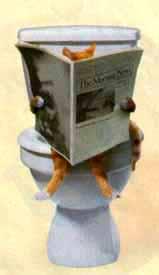
That's what I ask myself on a daily basis. How do periodicals like Time, The Washington Post, and other rags of their ilk continue to sell? The left-handed tilt and sensational accusations seem more like Poe or "The Brother's Grimm" than an honest portrayal of current events and the goings on of our world.
First off, I feel the newspapers are worse than the periodicals because they have been long trusted by the public to give us just the facts (shout out to Mr. Friday). Magazines, even though they call themselves "news magazines", are expected to have more opinion. In the case of newspapers, though, to quote Malcolm X " We've been hoodwinked! Bamboozled!" I know, I know, it's a free country. They can print whaterver they want...Yada, Yada. I guess it is the fault of those who read it if they take the shady articles at face value; but don't you think the newspapers have some responsibility to be impartial. I mean they are the only source of "News" that a lot of people get.
Don't get me wrong. Not all print articles I see are so blatant, but newspapers in general seem to pick and choose what they sensationalize. It's easy to spot. Some articles are very brief and almost coldly relayed, which I suppose is somewhat like Bill and Hilary's aniversary festivities
 these days. Other writings are much more opinion of the writer, however nutty it may be.
these days. Other writings are much more opinion of the writer, however nutty it may be.We still have to be weary of the so-called "straight facts" that are written. True, a fact is a fact, but a fact can be couched with opinion and slant quickly changing a fact into a little truth within a big lie. I know. I've been involed in or witnessed some events that were later written in the local paper. When I eventually read the write-ups, often-times it did not resemble my first-hand knowledge. We've all seen it done. These purveyors of poppycock give a story a certian tone in order for it to come across in a way that supports their cause, whatever that may be.
In short, I suppose newspapers have devolved from the window through which we see the world into a filter through which the world is shown to us. This causes the opinion of the unaware (most of the country) to be formed by someone elses thoughts. Those same people, if they only new more, would hopefully be able to come to a more thoughtful and sometimes even better conclusion. Basically if you had to make a bet on where to find truth in the newspaper, put your money on the obituarys. What's the solution to this problem? Suprisingly enough, there are three: 1. Research topics that are important to you before ariving at a conclusion. 2. Don't believe every thing you read. 3. Save your fifty cents for a can of Dr. Pepper and use the brain God gave you.
Please comment if the need strikes you.

"Z-V-B-X-R-P-L. I had that same horse when I had my eyes examined."

2 comments:
I don't know where you buy your Dr. Pepper for two bits, but I can't find it for less than 60 cents! At least a newspaper is cheaper than toilet paper. Rougher- but cheaper. Great points, good article
My local paper is decent but I can see what you're talking about.
Post a Comment